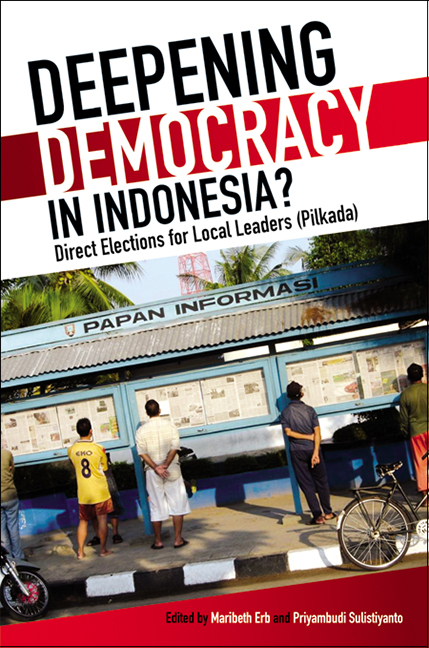Book contents
- Frontmatter
- Dedication
- Contents
- List of Tables
- List of Figures
- Contributors
- Acknowledgements
- Glossary
- 1 Indonesia and the Quest for “Democracy”
- 2 Pilkada Langsung: The First Step on the Long Road to a Dualistic Provincial and District Government
- Part I Political Parties, Politician Elites and the Voters
- Part II Media and Campaigns: Comparing Local and National Elections
- Part III Conflict, Ethnicity, and Political Divisions
- Index
2 - Pilkada Langsung: The First Step on the Long Road to a Dualistic Provincial and District Government
Published online by Cambridge University Press: 21 October 2015
- Frontmatter
- Dedication
- Contents
- List of Tables
- List of Figures
- Contributors
- Acknowledgements
- Glossary
- 1 Indonesia and the Quest for “Democracy”
- 2 Pilkada Langsung: The First Step on the Long Road to a Dualistic Provincial and District Government
- Part I Political Parties, Politician Elites and the Voters
- Part II Media and Campaigns: Comparing Local and National Elections
- Part III Conflict, Ethnicity, and Political Divisions
- Index
Summary
“Toute Nation a le Gouvernement qu'elle merite” — “Every Nation has the Government it deserves”. (Joseph le Maistre: Considerations sur la France)
HISTORICAL SETTING
One of the central characters in the Indonesian system of provincial and district (kabupaten) governments is the kepala daerah (head of an area/ region). The recent Law on Regional Government (No. 32/2004) stipulates that the kepala daerah be directly elected, a fundamental change in the Indonesian local political culture which will have many consequences, both in local settings as well in the context of local–central relationships. The election of the kepala daerah has been an important issue ever since the independence period. In the 1950s, with the experiment with parliamentary democracy, the relationship between kepala daerah and local parliament (Dewan Perwakilan Rakyat Daerah, DPRD) was confidence-based. The kepala daerah depended on the support of the majority of members of the DPRD and, consequently, the kepala daerah was responsible to the DPRD, which had the power of a vote of “no confidence” against the kepala daerah. This kind of political relationship was maintained in the context of the Parliamentary Democracy period in the 1950s.
During this period the kepala daerah was simultaneously also the chairman of the Council of Local Government (Dewan Pemerintahan Daerah, DPD) which consisted of political elites elected by and from the DPRD. By the end of the 1950s, the DPD was replaced by the Local Council of Daily Affairs (Badan Pemerintah Harian, BPH) to oversee the day-to-day running of local government activities. This council was also known as the “Government by the People” which implied that the DPRD was involved in the day-to-day activities of the local government through coordinating the government services.
During the New Order period the existence of the pemerintah daerah (local government, also known as pemda), which comprised the kepala daerah and Local Assembly (DPRD), was very important at both provincial and district levels. There are two important aspects that deserve attention here: the relationship between the kepala daerah and the DPRD, and the relationship between the local government and the central government. The Law on Local Government No. 5/1974 recognized the so-called consultative relationship in which the kepala daerah could not dissolve the DPRD and vice versa, the DPRD could not vote “no confidence” against the kepala daerah.
- Type
- Chapter
- Information
- Deepening Democracy in Indonesia?Direct Elections for Local Leaders (Pilkada), pp. 38 - 50Publisher: ISEAS–Yusof Ishak InstitutePrint publication year: 2009



